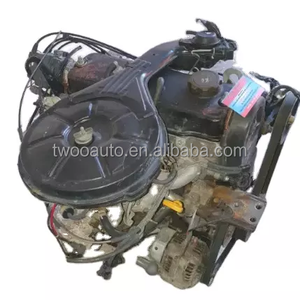Upgrade Your Experience with Authentic Toyota Tazz Engine for Sale
Wiki Article
Engine Purchasing Professional Tips on Choosing the Right Engine for Your Particular Needs
Picking the appropriate engine for your certain requirements involves a complex interaction of variables that go past simple horsepower numbers. By diving into the ins and outs of power versus performance, examining fuel ratings, and budgeting for long-term costs, one can truly enhance their engine choice.Power Vs. Performance: Locating the Equilibrium

When picking an engine, it is essential to strike an equilibrium between power and performance to meet your particular demands successfully. Power describes the engine's capability to create power for propulsion, determining elements like acceleration, towing capability, and general performance (Toyota Tazz Engine For Sale). On the other hand, performance connects to exactly how well the engine uses fuel to produce power, affecting variables such as gas economy and ecological kindness
Accomplishing the right balance in between power and efficiency is crucial because an engine that is too effective may consume excessive fuel, bring about higher operating expense and unneeded pressure on the environment. On the other hand, an engine that prioritizes effectiveness over power might lead to slow performance, specifically sought after circumstances like lugging hefty tons or driving uphill.
To make an informed decision, consider factors such as your normal driving problems, the designated usage of the automobile, and your personal choices. By evaluating your priorities and needs, you can choose an engine that strikes the best balance in between power and effectiveness, ensuring optimum efficiency while decreasing ecological effect and operating prices.
Understanding Engine Size and Type

Additionally, engine type plays an important duty in determining the efficiency features of an engine. Common engine types include inline engines, V engines, and rotary engines, each with its unique benefits and drawbacks. The engine type affects variables such as the engine's dimension, weight circulation, and power distribution. Understanding the interaction in between engine dimension and kind is essential in picking an engine that straightens with your details requirements and priorities, whether it be power, performance, or an equilibrium of both.
Consider Your Automobile's Requirements
If you are looking for an engine for a sturdy truck that will be utilized for towing, you will certainly require an effective engine with high torque capabilities. On the other hand, if you are choosing an engine for a portable car primarily utilized for city travelling, gas performance may be a much more important variable to take into consideration.Reviewing Gas Performance Scores
Examining fuel efficiency ratings is an essential element of picking the ideal engine for your automobile, making sure expense savings and ecological sustainability. Fuel efficiency ratings, typically gauged in miles per gallon (MPG) for gas engines or kilowatt-hours per 100 miles (kWh/100 miles) for electric engines, indicate just how far a car can travel on a details amount of fuel or electricity. Greater MPG or lower kWh/100 miles values indicate more reliable engines, equating to decreased gas expenses and lower carbon exhausts.When assessing gas efficiency ratings, consider your driving behaviors and requirements. A very fuel-efficient engine this content can result in substantial savings over time if you commute long ranges daily. In addition, compare various engine options within the exact same vehicle course to identify the most affordable choice. Aspects such as engine size, weight, the rules of aerodynamics, and hybrid or electric capacities can all influence gas efficiency.
Budgeting for Long-Term Prices
Tactically planning for lasting expenditures is imperative when selecting an engine, guaranteeing economic sustainability over the vehicle's life expectancy. While the first acquisition cost of an engine is a substantial variable, it is essential to consider the long-term costs connected with maintenance, repair services, and gas usage. Selecting an extra fuel-efficient engine might have a greater in advance expense but can lead to considerable financial savings over time. Regular maintenance, such as oil modifications, filter replacements, and tune-ups, is necessary to maintain the engine running efficiently and effectively, reducing the risk of costly repair work down the line.In addition, looking into the availability and cost of replacement components for the picked engine is crucial in spending plan preparation. By thoroughly budgeting for these long-lasting expenses and factoring them right into the decision-making process, individuals can pick an engine that not just fulfills their immediate demands however additionally continues to be affordable throughout its life expectancy.
Final Thought
In verdict, selecting the best engine for your details needs requires balancing power and performance, understanding engine size and type, considering your automobile's needs, assessing fuel effectiveness rankings, and budgeting for lasting costs. By thoroughly thinking about these variables, you can ensure that you choose an engine that satisfies your requirements and supplies optimal efficiency for your lorry.To further refine the selection process of an engine that strikes the optimal balance between power and efficiency, it is necessary to dive right into the ins and outs of understanding dig this engine dimension and type. Engine size refers to the total volume of air and fuel that can be pushed through the engine cyndrical tubes. Common engine kinds include inline engines, V engines, and rotating engines, each with its unique benefits and downsides. Understanding the interaction between engine dimension and type is essential in selecting an engine that lines up read this post here with your certain demands and concerns, whether it be power, performance, or an equilibrium of both.
Fuel performance scores, generally measured in miles per gallon (MPG) for gas engines or kilowatt-hours per 100 miles (kWh/100 miles) for electrical engines, suggest just how far a car can travel on a particular amount of gas or electrical power.
Report this wiki page